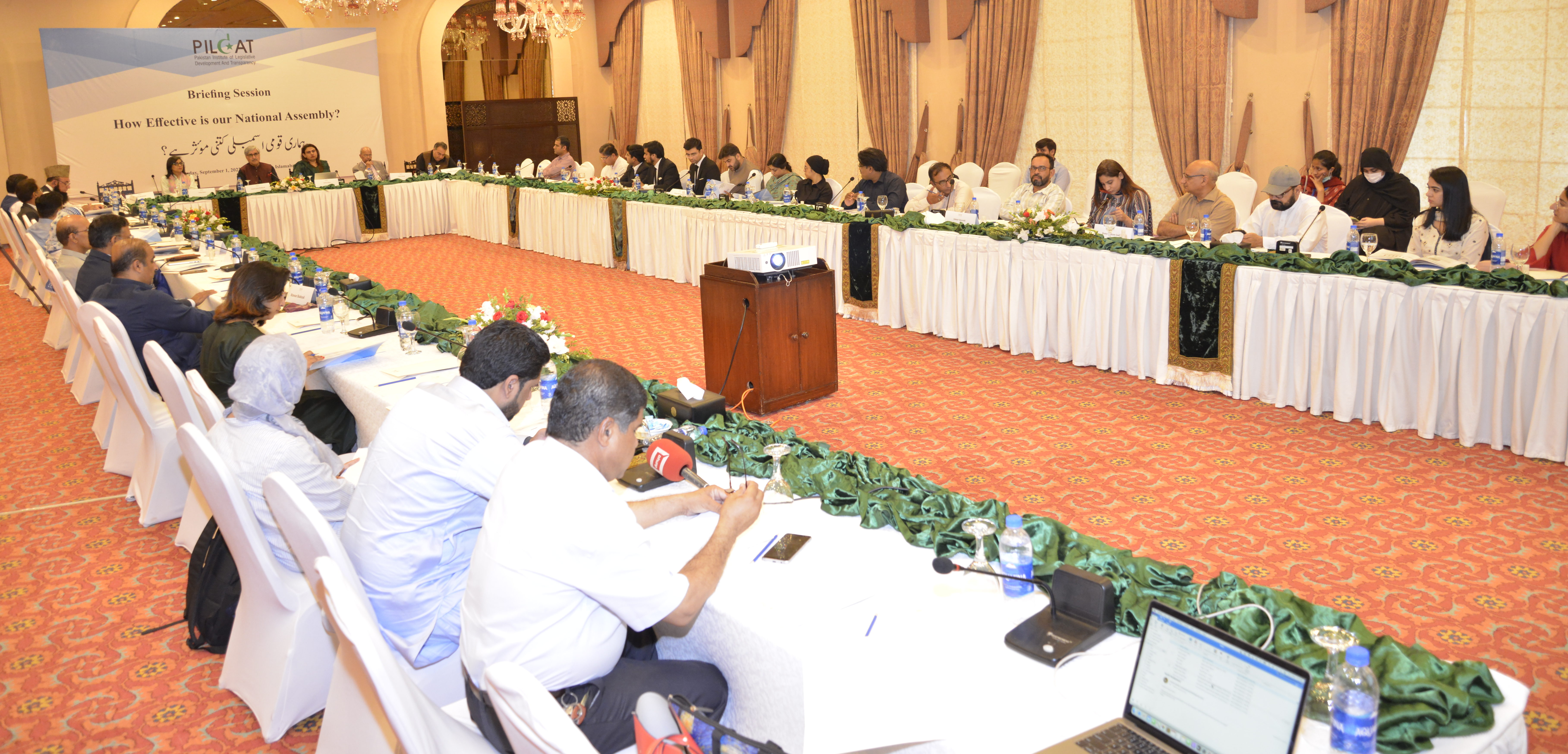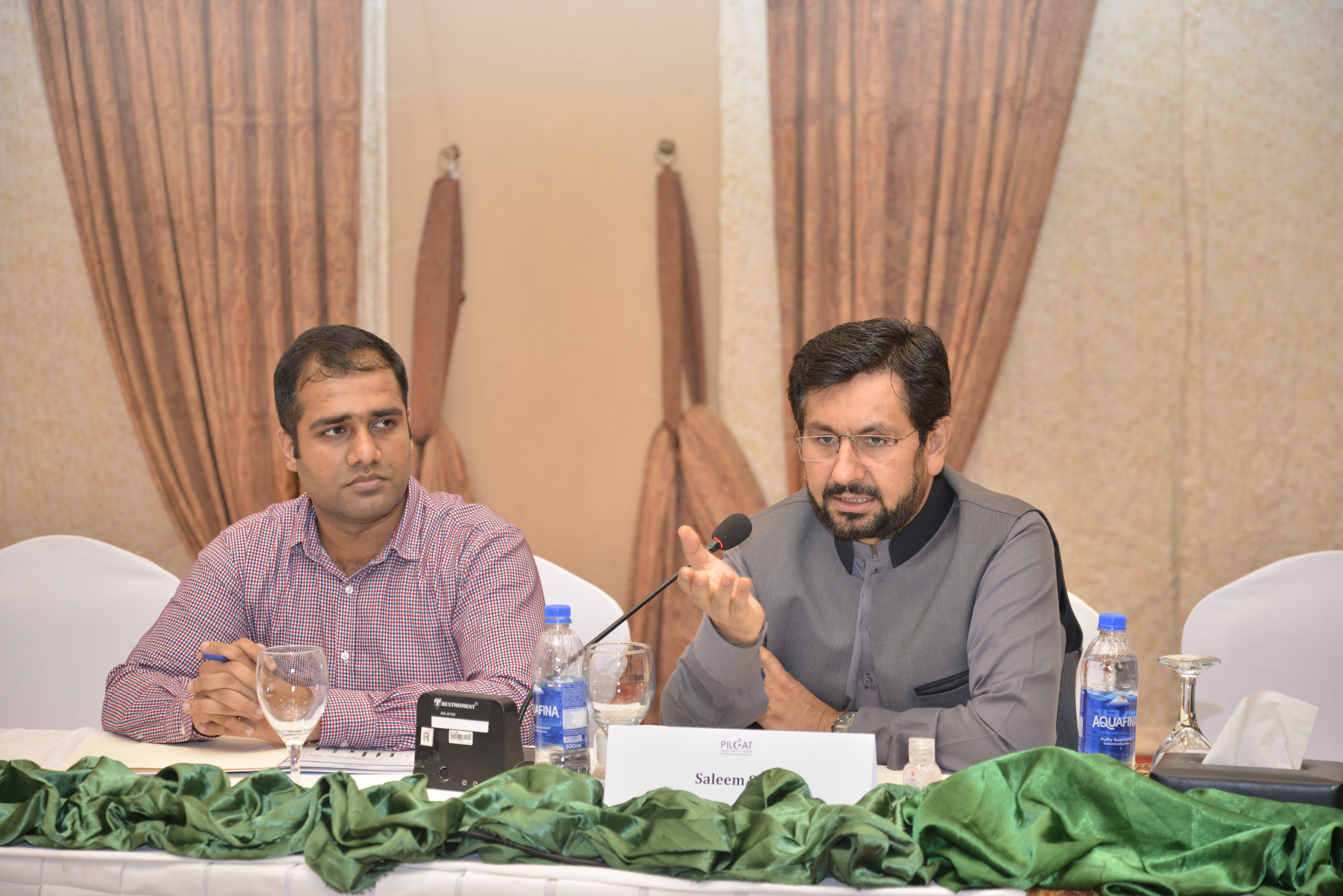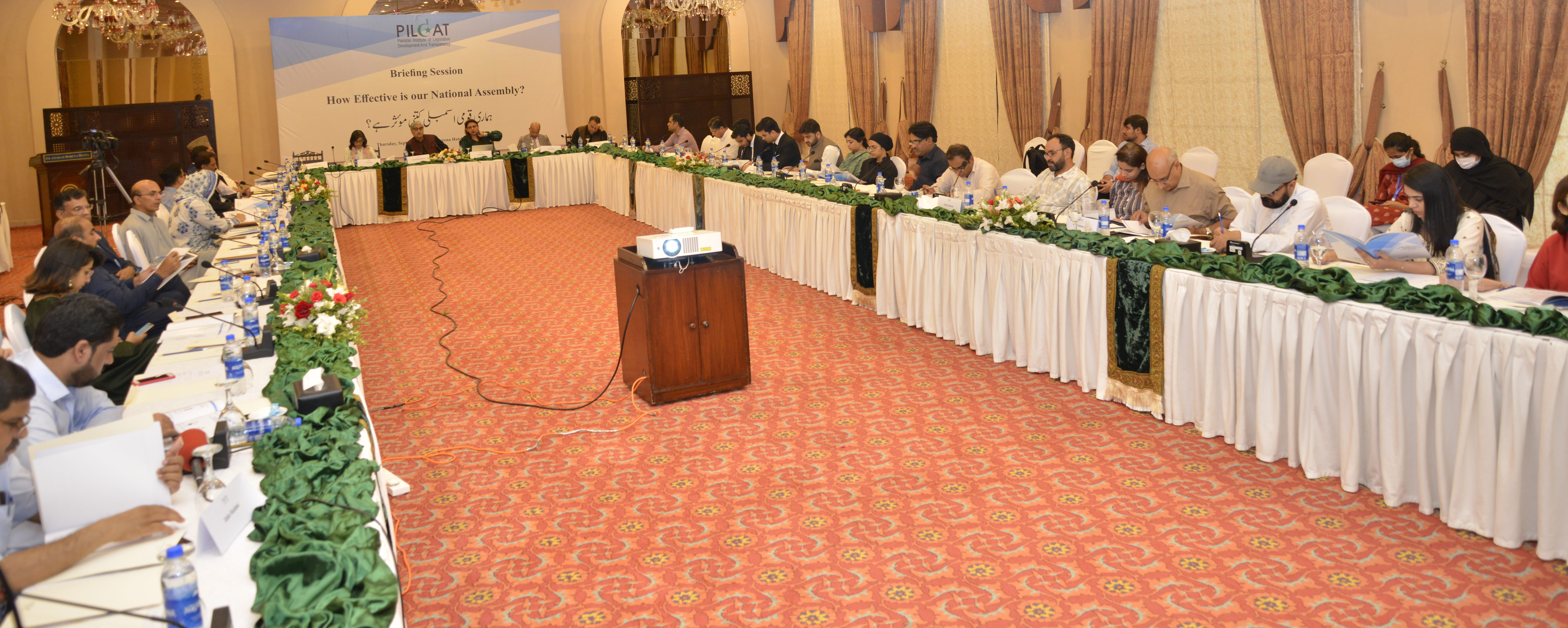September 01; It is citizens’ elected representatives themselves who have to ensure effectiveness of the National Assembly. National Assembly can be just as effective as members wish to make it or as ineffective as members wish to do so. This was stated at the PILDAT Briefing Session which was organized to showcase PILDAT’s Report on Performance of 4th Year of the 15th National Assembly. Speakers at the Briefing included Ms. Arifa Noor, Senior Anchor Dawn TV, Mr. Tahir Khalil, Bureau Chief, Jang Islamabad, Mr. Asif Bashir Choudhry, Secretary, Parliamentary Reporters Association, Mr. Amir Waseem, Bureau Chief Dawn Islamabad, Mr. Ahmed Bilal Mehboob, President PILDAT and Ms. Aasiya Riaz.
Presenting an overview of the performance of 15th National Assembly, Mr. Ahmed Bilal Mehboob, President PILDAT said that successive leaders have not prioritized Parliament beyond their electorate which is reflected in lack of relevance of Parliament. One can partly understand that since delivery of required State services is not effective, MPs use a majority of their time in working as a conduit to facilitate their services. However, the Parliament remains of supreme importance within the structure of democracy. Presenting key statistics from the working of 15th National Assembly in 4th year, he said that the Assembly could not complete on average 59% agenda in its sittings. If one looks at what it costs taxpayers to run the Assembly, the annual budget of National Assembly has increased to PKR 5.6 million The per MNA cost has become PKR 16.32 million. The per sitting cost is PKR 64.15 million and the cost of a Working Hour stands at PKR 31.35 million. He emphasised that sharing the budget and costs is not to suggest that it is costly to run the Assembly but that emphasis must be paid on improving its performance. This would not be possible until citizens to hold parliament to account.
Ms. Arifa Noor, Senior Anchor Dawn TV, said that it with each passing year, Parliament appears to be more and more irrelevant in the larger scheme of democracy in Pakistan. It also appears that as political parties’ votes consolidate, this has resulted in further strengthening of the leaders of the party and there remain no counter-check of parliamentary party on the leader which reflects in performance of the Assembly. Even though law-making by ordinance is problematic as pointed out by PILDAT, law making within Assembly has also not witnessed any improvement. She also pointed out that media coverage may be responsible somewhat for the lack of importance citizens place on parliamentary proceedings. While earlier, reporters wrote detailed Parliament diaries, now 20 TV talk shows provide an alternate venue for MPs to share their perspective. One should also question what is the utility of the Parliament for a popular leader? It is critically important that there is effective local government in Pakistan so that local governments take up the issues of development and MPs can focus on legislation, representation and oversight.
Sharing his perspectives at the session, Mr. Tahir Khalil, Bureau Chief, Jang Islamabad said that performance of the Parliament has to be reviewed in historical perspective of frequent disruptions of parliamentary democracy. There is a particular mindset that does not let parliament flourish.
Mr. Amir Waseem, Bureau Chief Dawn Islamabad, said that beyond quantitative analysis of laws, one must also view quality of debate and of legislation in the Assembly to get a complete picture. Same is true of meeting the constitutional requirement of 130 days which is meaningless. Until decisions are made inside the Parliament, it will remain irrelevant. He believed that the National Assembly has just become a debating club. Role of Speaker is crucial in functioning of the Parliament. If Speakers keep a partial and biased attitude, this does not help the Assembly. Parties should keep strict criteria for nominating MPs for the role of Presiding Officers who have to serve both as custodian and judges. He stressed that alongside effective Local Government system, functional Students Unions are necessary.
Mr. Asif Bashir Choudhry, Secretary, Parliamentary Reporters Association said that strange and unprecedented things have happened in 4th year of 15th National Assembly including its dissolution and Speaker rejecting the resolution of Vote of No Confidence which eventually had to be decided by the Supreme Court. There is such lack of tolerance that if a party cannot retain government, it refuses to sit in the National Assembly. Why has the Speaker accepted partial and not all resignations of PTI MNAs is also inexplicable. A large number of laws are passed under an hour or legislation is carried out by ordinances. Local government not on the agenda of any major political party. Role of money in obtaining tickets has become the norm which means that members, once elected, are not aware of their responsibilities and political appointees in the Parliament are unable to help MPs and PIPS is worse than Parliament secretariat.
Parliamentary reporters were asked to address questions including where change was witnessed in the performance of the National Assembly under the tenure of the PTI government (3 years & 8 months) since it was elected on promise of change, expectations of citizens from the working of the National Assembly, what should be the role of Assembly in the larger scheme of democratic governance and what are some of the critical areas of reform that are required to improve performance of the National Assembly of Pakistan.
Earlier, Ms. Aasiya Riaz shared details of the performance of the 15th National Assembly in its 4th year based on key performance indicators (KPIs) including legislation, working days and hours, quorum, attendance and others, etc.
Participants who joined the session included Maulana Abdul Akbar Chitrali, MNA (MMAP), Dr. Shazia Sobia, MNA (PPPP) Mr. Saleem Safi, Senior Anchor/Analyst, Syed Shamoon Hashmi, Additional Secretary (Special Initiatives), National Assembly Secretariat, Mr. Muhammad Ghiyas, Deputy Secretary (Legislation), National Assembly Secretariat, Mr. Hassan Raza Gillani, Section Officer (Legislation), National Assembly Secretariat, Mr. Mukhtar Ahmed Ali, Executive Director, Centre for Peace and Development Initiatives (CPDI), Mr. Ghulam Murtaza, Director, Peace and Education Foundation (PEF), Ms. Irsa Shafiq, Research and Communication officer, Peace and Education Foundation (PEF), Dr. Fizza Batool, Programme Manager, Pakistan Institute for Peace Studies (PIPS), Mr. Aamer Khan, Coordinator-Express News, Mr. Saquib Virk, Reporter, Express News, Mr. Faizan Sultan, Express News, Mr. Rizwan Shahzad, Parliamentary Correspondent, Express Tribune, Rana Ghulam Qadir, Chief Reporter Islamabad, Jang, Mr. Atif Sherazi, Senior Correspondent, Jang, Ms. Nimra Atiq, Jang, Mr. Bilal Atiq, Jang, Mr. Muhammad Waqar, Correspondent, Jang, Ms. Nasuheen Yousaf, Political Correspondent, Geo News, Mr. Zubair Qureshi, Chief Reporter Islamabad, Pakistan Observer, Mr. Zafar Hussain Hashmi, Chief Reporter Islamabad, Daily Dunya, Mr. Almas Haider Naqvi, Senior Correspondent, Daily Dunya, Mr. Faisal Raza Khan, Senior Correspondent, 92 News, Ms. Maryam Malik, Reporter, PTV, Ms. Waiza Rafique, Advocate High Court Islamabad, Mr. Qasim Sarfraz, Advocate High Court Islamabad, Mr. Naeem Khan, Advocate High Court Islamabad, Malik Abdul Rehman, Advocate High Court Islamabad and Dr. Waqas Saleem, Department of Anthropology, Quaid e Azam University (QAU). Members of 17th Youth Parliament Pakistan who joined the session included Malik Waleed Hassan (NA-59 Rawalpindi-III), Ms. Maira Shaikh (NA-54 Islamabad-III), Ms. Noor ul Ain Rehman (NA-61 Rawalpindi-V), Ms. Bakhtawar Javed (NA-60 Rawalpindi-IV), Ms. Summiya Bano (NA-62 Rawalpindi-VI), Ms. Noor Mehal Kamal (NA-53 Islamabad-II) and Mr. Zargham (NA-53 Islamabad-II).










